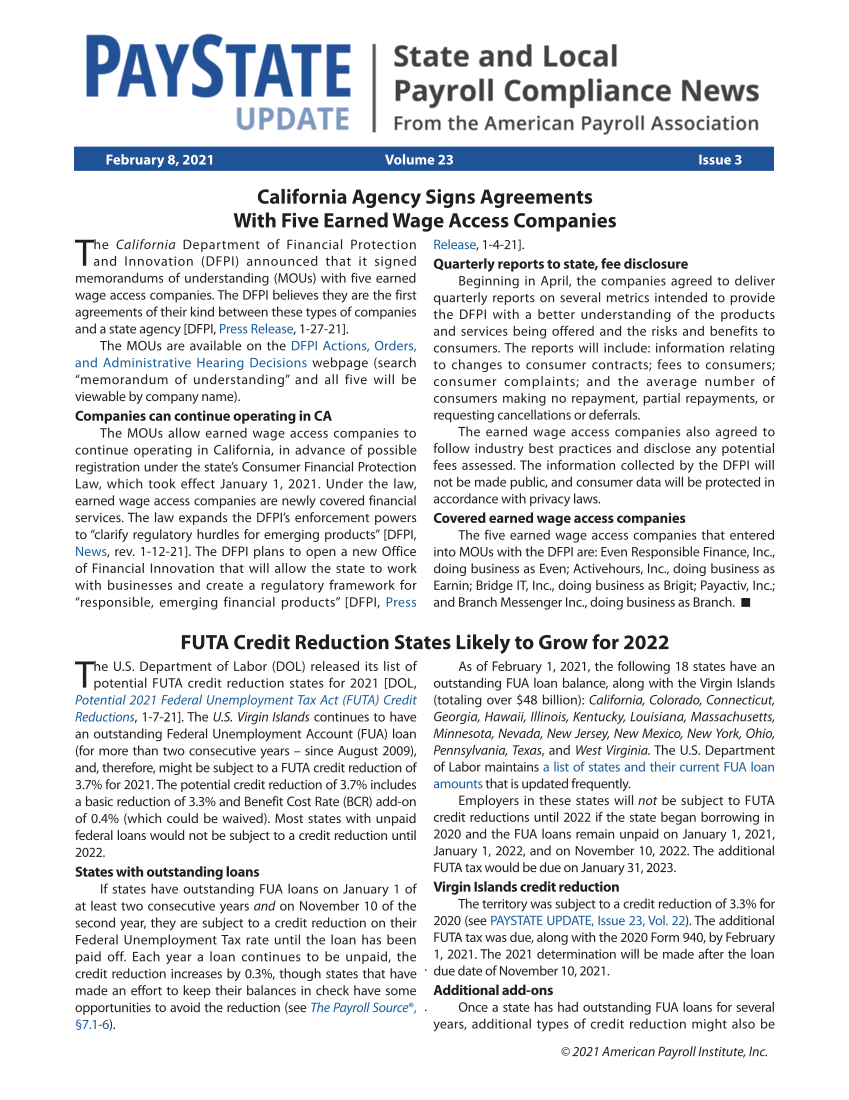© 2021 American Payroll Institute, Inc. California Agency Signs Agreements With Five Earned Wage Access Companies TandCalifornia he Department of Financial Protection Innovation (DFPI) announced that it signed memorandums of understanding (MOUs) with five earned wage access companies. The DFPI believes they are the first agreements of their kind between these types of companies and a state agency [DFPI, Press Release, 1-27-21]. The MOUs are available on the DFPI Actions, Orders, and Administrative Hearing Decisions webpage (search “memorandum of understanding” and all five will be viewable by company name). Companies can continue operating in CA The MOUs allow earned wage access companies to continue operating in California, in advance of possible registration under the state’s Consumer Financial Protection Law, which took effect January 1, 2021. Under the law, earned wage access companies are newly covered financial services. The law expands the DFPI’s enforcement powers to “clarify regulatory hurdles for emerging products” [DFPI, News, rev. 1-12-21]. The DFPI plans to open a new Office of Financial Innovation that will allow the state to work with businesses and create a regulatory framework for “responsible, emerging financial products” [DFPI, Press Release, 1-4-21]. Quarterly reports to state, fee disclosure Beginning in April, the companies agreed to deliver quarterly reports on several metrics intended to provide the DFPI with a better understanding of the products and services being offered and the risks and benefits to consumers. The reports will include: information relating to changes to consumer contracts fees to consumers consumer complaints and the average number of consumers making no repayment, partial repayments, or requesting cancellations or deferrals. The earned wage access companies also agreed to follow industry best practices and disclose any potential fees assessed. The information collected by the DFPI will not be made public, and consumer data will be protected in accordance with privacy laws. Covered earned wage access companies The five earned wage access companies that entered into MOUs with the DFPI are: Even Responsible Finance, Inc., doing business as Even Activehours, Inc., doing business as Earnin Bridge IT, Inc., doing business as Brigit Payactiv, Inc. and Branch Messenger Inc., doing business as Branch. FUTA Credit Reduction States Likely to Grow for 2022 Tpotential he U.S. Department of Labor (DOL) released its list of FUTA credit reduction states for 2021 [DOL, Potential 2021 Federal Unemployment Tax Act (FUTA) Credit Reductions, 1-7-21]. The U.S. Virgin Islands continues to have an outstanding Federal Unemployment Account (FUA) loan (for more than two consecutive years – since August 2009), and, therefore, might be subject to a FUTA credit reduction of 3.7% for 2021. The potential credit reduction of 3.7% includes a basic reduction of 3.3% and Benefit Cost Rate (BCR) add-on of 0.4% (which could be waived). Most states with unpaid federal loans would not be subject to a credit reduction until 2022. States with outstanding loans If states have outstanding FUA loans on January 1 of at least two consecutive years and on November 10 of the second year, they are subject to a credit reduction on their Federal Unemployment Tax rate until the loan has been paid off. Each year a loan continues to be unpaid, the credit reduction increases by 0.3%, though states that have made an effort to keep their balances in check have some opportunities to avoid the reduction (see The Payroll Source®, §7.1-6). As of February 1, 2021, the following 18 states have an outstanding FUA loan balance, along with the Virgin Islands (totaling over $48 billion): California, Colorado, Connecticut, Georgia, Hawaii, Illinois, Kentucky, Louisiana, Massachusetts, Minnesota, Nevada, New Jersey, New Mexico, New York, Ohio, Pennsylvania, Texas, and West Virginia. The U.S. Department of Labor maintains a list of states and their current FUA loan amounts that is updated frequently. Employers in these states will not be subject to FUTA credit reductions until 2022 if the state began borrowing in 2020 and the FUA loans remain unpaid on January 1, 2021, January 1, 2022, and on November 10, 2022. The additional FUTA tax would be due on January 31, 2023. Virgin Islands credit reduction The territory was subject to a credit reduction of 3.3% for 2020 (see PAYSTATE UPDATE, Issue 23, Vol. 22). The additional FUTA tax was due, along with the 2020 Form 940, by February 1, 2021. The 2021 determination will be made after the loan due date of November 10, 2021. Additional add-ons Once a state has had outstanding FUA loans for several years, additional types of credit reduction might also be February 8, 2021 Volume 23 Issue 3
Printed for: PayrollOrg Bookshelf © 2024 American Payroll Institute, Inc. All Rights reserved. From: PayrollOrg Digital Publications (bookshelf.payroll.org)







